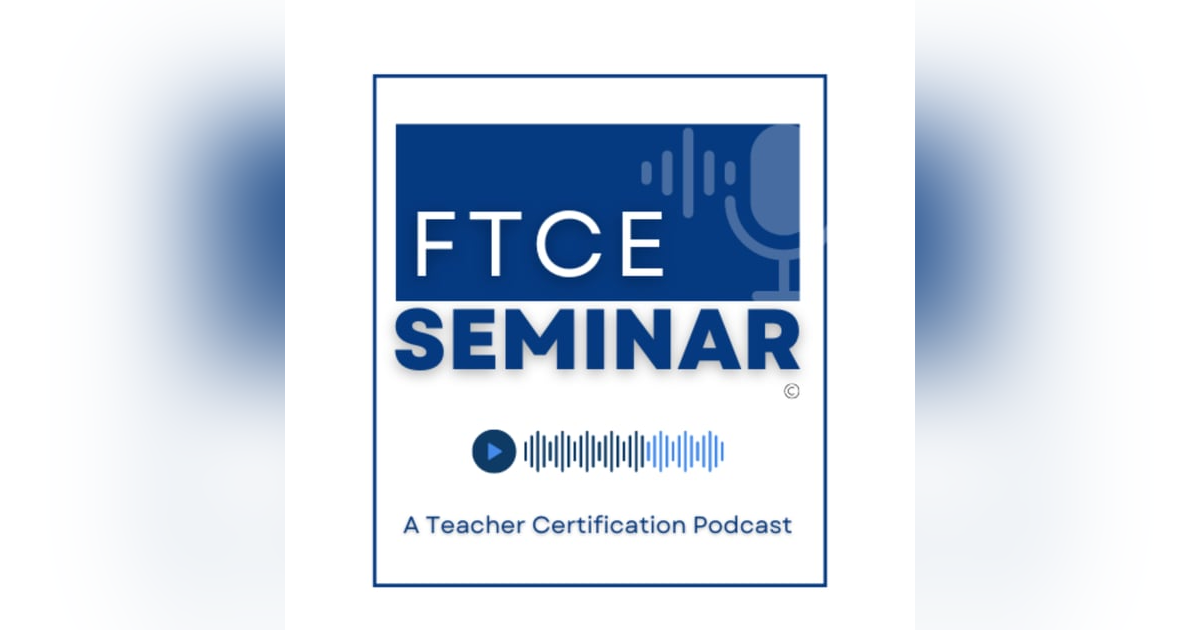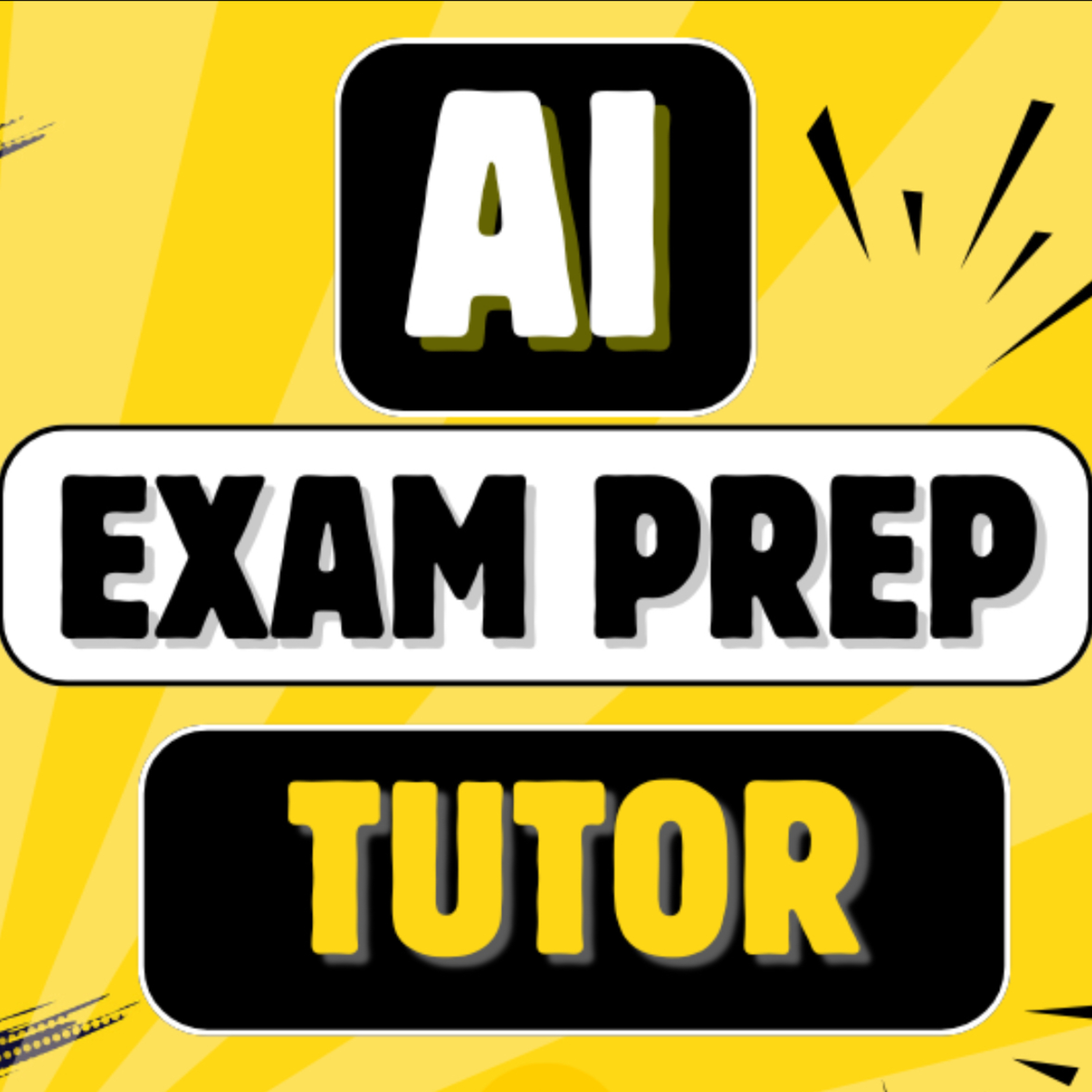E10: FTCE | General Knowledge | English | How-to use Commas
E10: Teacher Certification Podcasts | FTCE General Knowledge | English | How-to use Commas
In Episode 10, I’ll be talking about the FTCE General Knowledge English Language Skills Subtest. This is part 3 of a multi-series review of what YOU need to know to pass the English section of the GK. About FTCE Seminar
How do you PASS the Florida Teacher Certification Exams (FTCE)? On this podcast, we will be discussing concepts from the FTCE Testing Blueprint to help you prepare for the exam. ..Not only is each episode based on the FTCE General Knowledge essay subtest, English Language Skills subtest, Reading subtest, and Mathematics subtest, but I am also using my experience as a FTCE Tutor, 10 year classroom teacher who has passed the FTCE GK Exam, FTCE Professional Education Exam, FTCE Exceptional Student Education Exam, FTCE English 6-12 Exam, FTCE Journalism Exam, and the Reading Endorsement to help you pass and start teaching. ..How do educational podcasts work? Each podcast covers one concept from the FTCE Testing Blueprint. This method is called micro-learning where you listen repeatedly to concepts to reinforce your knowledge and understanding. Try it out! Check it out! And leave your questions and comments below.
-----------------------------------------------
RESOURCES (Free)
💢 FTCE/FELE https://www.fl.nesinc.com/
💢 FTCE Seminar Websitehttps://www.ftceseminar.com/
💢 FTCE Podcasting Study Guides @ TpTStudy Hacks Podcast Guide.
-----------------------------------------------
RESOURCES (For Purchase)
⚡️ FTCE Podcasting Study Guides @ TpT
- FTCE GK Essay Prep
- FTCE GK English Language Skills Prep
- FTCE GK Reading Prep
- FTCE GK Math Prep
⚡️ FTCE Test Prep Books @ Amazon
- General Knowledge Exam https://amzn.to/3QQrCrv
- Professional Education Exam https://amzn.to/4aHwuql
- Elementary Education Exam https://amzn.to/3WN5FNX
- Exceptional Student Education Exam https://amzn.to/3V5CLY0
- *As an Amazon Associate I earn from qualifying purchases made via links which provide a small commission to this channel and accompanying website.
-----------------------------------------------
Support and Donations
💟This podcast and channel are listener supported, contributions can be made at:https://www.buymeacoffee.com/ftceseminar
You can subscribe to the FTCE Seminar Podcast at www.ftceseminar.com
------------------------------------------------
#FTCE #teachercertification #teachers #education #podcast #educationalpodcast #certification #mathprep #professionaleducation #englishprep #essayprep #generalknowledge #teachertraining #exam #test #motivation #study #studyhacks #english #reading #maths #teachereducation #assessment #testtakingstrategies #readings #mathpreparation #englishgrammar #exammotivation #exampreparation #overthinking #practicetests #motivational #testanxiety #readingcomprehension
--- Support this podcast: https://podcasters.spotify.com/pod/show/ftceseminar/support0:00:00
Welcome to Episode 10 of FTCE Seminar, the Florida Teacher Certification Exam Podcast, where we talk about testing tips, study hacks, and how to prep to pass the FTCE. I'm your host Mercedes Musto. In today's episode, I'll be talking about the FTCE General Knowledge English Language Skills Subtest. This is part three of a multi-series review of what you need to know to pass the English section of the GK. Let's get started. In this episode we will review commas, when to use them, and how to use them properly. Concept number three, commas. One of my favorite online
0:00:43
writing labs is Purdue OWL and they explain 11 ways to use commas. Ooh, 11, that's a lot. So let's unpack three comma concepts that you need to know. Commas are mostly used to indicate a brief pause so that our sentences have some poetic finesse. Okay, okay, I just wanted to be fancy there, but for real, commas help us to create sentences that flow, like this one. Number one, I walked, washed, and fed the
0:01:19
dog today. Sounds smooth, right? That's because we use commas to separate words in a series or in a list. Now listen again and visualize where to place the comma. I walked, washed, and fed the dog today. Perfecto. I emphasize the comma and because although using conjunction is optional, oh, I mean, depending on what you're trying to clarify, of course, it's it's another common and correct way to use a comma, like in the next example. Number two, use a comma when you're linking two independent clauses with a coordinating conjunction.
0:02:02
On a side note, an independent clause basically means that the group of words has a subject and a verb. I mean, it's its own sentence, it's independent. And an example of a coordinating conjunction, well, that's a word like and, or, but, or, or, or for, or nor. I mean, it's that whole fanboys thing. You get the point. Like in the
0:02:28
sentence, listen for the pause. She enjoyed podcasting, but she mostly remembered, she's mostly remembered for her retelling of dad jokes. Hmm, that wasn't as smooth as I thought. Let's try it again. It's funny because it's true. Okay, okay. She She enjoyed podcasting, comma, but she is mostly remembered for her retelling of dad jokes. Haha, yeah, okay, did you hear the pause? That's where the comma goes and it's before the conjunction. Okay, listen again. She enjoyed podcasting, comma, but she is mostly remembered for her Now that could also be comma and or comma yet. Basically the formula is
0:03:20
independent clause comma coordinating conjunction followed by another independent clause period. Boom you got it. Number three we also need commas to separate out non-essential words. That sounds so rude, right? Like, these words don't really matter. But I like to call these side thoughts or extra information moments that we totally want to include in our sentences. Like this. This podcast is, I think, and I'm sure you agree, a great way to study while you're multitasking. Did you hear my extra information moment? The little side thought? It was, I think, and I'm sure you agree, well that wasn't necessary to the sentence, but I wanted to add it so I placed a group of words within two commas like this.
0:04:13
This podcast is, comma, I think, and I'm sure you agree, comma, a great way to study while you're multitasking. Let's review. Commas show us where to pause in a sentence and really help us clarify what we're trying to communicate. We can use commas to separate words in a series or in a list. We can use commas to link two independent clauses with a coordinating conjunction. And finally, we can use commas to add non-essential information to a sentence like I do all the time. See what I did there? Now, Purdue OWL has eight additional and fancy ways to use commas to give your sentences some finesse.
0:04:57
We simply covered three, and that's a start. For more practice with commas or study hacks, visit ftceseminar.com. The important thing is to start studying and start studying today so you can pass the Florida Teacher Certification Exam. Well, what are you waiting for? Go on now, start studying. This is your host Mercedes Musto. Join me again on FTCE Seminar, a Florida teacher certification
0:05:23
exam podcast, so you can prep to pass the FTCE. I'd like to thank Kate, Samantha, and the Pickens Multimedia Studio at the University of West Florida for making this podcast possible. For more materials, visit ftceseminar.com and hey, check us out on YouTube at FTCE Seminar.
Transcribed with Cockatoo














